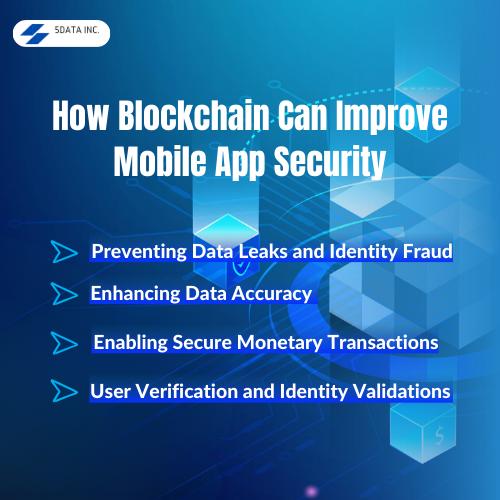Today, mobile applications, are an integral part of our daily lives, supporting industries such as healthcare, finance, and supply chain management. With the rising risk of data breaches, identity theft, and vulnerabilities in centralized servers, mobile app developers are actively seeking ways to take control and improve mobile app security. Blockchain technology, with its transformative potential, not only enhances data security and ensures data consistency but also empowers developers, giving them a sense of control and confidence in their ability to protect user trust.
This article will explore how to adopt blockchain for mobile apps, the benefits of blockchain features, and the step-by-step process for implementation. We will also address common questions about using blockchain for app security and its role in safeguarding sensitive data and online payments.
Key Takeaways
- Blockchain provides strong data protection through decentralized storage, cryptographic encryption, and immutable records, effectively preventing data breaches, identity fraud, and unauthorized access.
- Blockchain boosts data accuracy, transparency, and trust across mobile apps in healthcare, finance, and logistics. Its smart contracts and secure identity validation are essential for future app development.
Understanding Blockchain Technology
Blockchain is a secure, decentralized digital ledger that records transactions across distributed nodes. Its transparency and tamper-resistance enhance app security, offering a reliable alternative to traditional centralized systems.Core Features of Blockchain
- Decentralization: No single point of failure or control.
- Data Correctness: Once data is recorded, it cannot be altered.
- Transparency: All transactions are visible on the network.
- Security: Cryptographic encryption safeguards private user data.
- Efficiency: Automation through digital contracts reduces delays and transaction fees.
How Blockchain Can Improve Mobile App Security
To enhance the security of your blockchain-based mobile app development, consider the following best practices:- Preventing Data Leaks and Identity Fraud: By decentralizing data retention, blockchain eliminates vulnerabilities associated with centralized systems, reducing the risk of data leaks and hacking. Identity validation systems built on blockchain ensure that only authorized users can access the app.
- Enhancing Data Accuracy: Blockchain guarantees data accuracy by recording every transaction on an immutable blockchain system. This feature is crucial for app development with sensitive data like digital payments or digital assets.
- Enabling Secure Monetary Transactions: Blockchain offers safe transactions through encrypted records for apps managing monetary transactions. It also uses smart contracts to automate payments, reducing fraud risks and transaction fees.
- User Verification and Identity Validations: Blockchain-based user verification solutions ensure that mobile applications can securely validate user identities, reducing the risk of ID theft.

Steps To Implement Blockchain in Mobile Apps
Implementing blockchain into existing mobile apps can be an elaborate process that requires careful planning and technical expertise. Here’s a general overview of the steps involved: Step 1: Analyze App Security Requirements- Identify app needs: Does the app development require data privacy, access verification, or secure payment transactions?
- Assess the data: Determine if the app deals with sensitive user data, digital assets, or healthcare information.
- Select a suitable blockchain platform based on app development requirements.
- Ethereum for smart contract integration.
- Hyperledger for enterprise solutions.
- Stellar for efficient online transactions.
- Incorporate essential blockchain characteristics.
- Smart contracts for automating tasks and transactions.
- Distributed systems for secure data repositories and transfer.
- Identity verification for secure user identification.
- Design a user-friendly UI while ensuring security is not compromised.
- Work with experienced app programmers to streamline blockchain software development.
- Conduct thorough testing to ensure the blockchain platforms operate seamlessly and securely.
- Test for breach of data security and data validity.
- Performance of secure transactions.
- Compatibility with existing mobile software.
Applications of Blockchain in Mobile Apps
With growing concerns about information security and mobile security, blockchain deployment is set to become more widespread in the future. As the technology evolves, it will not just improve security but also redefine how mobile programs handle data precision, financial exchanges, and access control. This future potential of blockchain in mobile app software development is indeed exciting.- Health Care: Blockchain can protect clinical records and ensure the security of medical history in healthcare apps. Example: Blockchain helps track medical histories and restricts access to approved users.
- Financial Apps: Enables secure digital transactions, reduces fraud, and automates payments with smart contracts. Example: Mobile wallets handling cryptocurrencies or virtual assets.
- Logistics Management: Tracks goods in real-time, ensuring data precision and reducing manual errors. Example: Blockchain records every step in the supply chain, improving transparency.
- Identity Validation Apps: Ensures secure user authentication and reduces ID theft.
Blockchain in Mobile App Development
Blockchain technology has the potential to change drastically in various industries. Some future applications include:- Enhanced Security: Blockchain ensures secure data saving, reducing the risk of breaches.
- Improved Data consistency: Data recorded on the blockchain cannot be altered.
- Cost Efficiency: Reduces processing fees through automated processes.
- Decentralized System: Eliminates single points of failure, improving app resilience.
- Trust and Transparency: Builds user trust through immutable transaction records.
Challenges of Leverage Blockchain
While blockchain offers significant benefits, there are several challenges to consider:- Blockchain acceptance: Deploying blockchain requires significant expertise and investment.
- User Experience: Blockchain technology may face limitations for apps with massive user bases.
- Scalability Issues: Balancing security and a seamless UI is challenging.
- Blockchain acceptance: Many businesses need more awareness to adopt blockchain.
Conclusion
Applying blockchain to mobile software development is a game-changer for enhancing mobile app security. By ensuring data accuracy, information integrity, and secure monetary transactions, blockchain technology has become a vital solution for industries dealing with personal data. Despite the challenges, the benefits of blockchain adoption far outweigh them, providing reassurance about the value of your investment and making it essential for mobile app creators looking to build secure, reliable, and future-ready mobile apps.Frequently Asked Questions
1. How does blockchain improve security in mobile apps?
Blockchain improves security by decentralizing data backup and encrypting secure data. It prevents unauthorized access, ensures data reliability, and reduces identity fraud risks.2. What is the role of smart contracts in mobile applications?
Smart contracts automate and secure workflows, such as payments and digital transactions, eliminating the need for intermediaries and reducing fraud.3. Can blockchain be integrated into current mobile software?
Yes, blockchain can be integrated into current mobile software by modifying its back-end infrastructure to include decentralized data storage and transaction processing.
Rasmita Patro
Author
